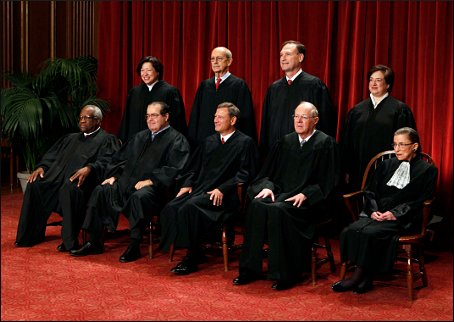What Happens If the Supreme Court Strikes Down the Individual Mandate?

When I discussed the case last week with a number of conservative law professors, most were sure that the Supreme Court would uphold the Affordable Care Act in its entirety. There was certainly a basis for thinking that the Court would come out that way. The government has good arguments based on precedent to uphold the individual mandate under any of three separate provisions of the Constitution – the clauses giving Congress the power to regulate commerce among the states, impose taxes, and enact laws “necessary and proper” to these other powers. But the comments of conservative Justices at the oral argument signal a very real chance – maybe a likelihood – that the government could lose that part of the case. It is also possible that it will lose on a challenge to a separate provision of the statute, which extends Medicaid to many more Americans, but that seems less likely.
A decision striking down the individual mandate, or the statute as a whole, would have little direct application to other cases. From the beginning, the statute’s challengers have insisted that it was an unprecedented use of federal power, and the Court’s decision would almost certainly be predicated on the Affordable Care Act’s allegedly unique futures. However, the willingness of a majority of Justices to strike down a major economic regulation for the first time in 75 years would be a sign of just how far the Supreme Court’s conservative Justices have moved away from the idea of judicial restraint. This renewed assertiveness could surface in other cases as well, even if the legal issues are quite different. If nothing else, such a decision would guarantee that the Court will remain a center of political controversy for years to come.
Putting aside such speculation about the Court’s future, striking down the individual mandate would also have immediate practical consequences. The extent of the consequences depends on how much of the statute falls along with the individual mandate. There are several possibilities. If only the individual mandate falls, people could wait until they get sick before buying insurance. Other provisions of the law prevent insurance companies from protecting themselves by excluding existing conditions from coverage or charging more based on individual health history. Some companies might choose to exit the health care market.
Another possibility is that those restrictions on insurance companies would also disappear but the remainder of the statute would be upheld. This would cut off health insurance to a significant number of people who would have received it otherwise, but it would leave the bulk of the law intact. Finally, the Court could strike down the whole statute, although no one has raised any constitutional arguments against the vast majority of provisions. That would cause some significant disruption to insurance companies and state governments, which have been working to comply with the law. This would also eliminate other provisions, like increased prescription drug benefits under Medicare, insurance coverage for grown children under 26, and coverage for preventive care like cancer screening.
The Affordable Care Act is an ungainly compromise. It tries to remodel the existing system, which consists of private health insurance for some and government insurance (Medicaid and Medicare) for others. This remodeling effort is the source of the individual mandate and the Medicaid provisions that were attacked before the Court. Ironically, a more radical statute – for example, expanding Medicare to include many more Americans – would have avoided these vulnerable features. But compromises seem to be an endangered species in contemporary America. It remains to be seen whether a Supreme Court decision upsetting this compromise will lead to anything better.



